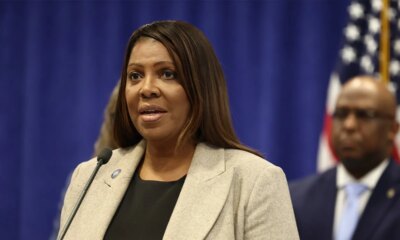North Dakota
Sale of Ponzi scheme cattle company could benefit burned investors

(North Dakota Monitor)
BY: JEFF BEACH
KILLDEER, N.D. (North Dakota Monitor) – A North Dakota investor says the purchase of a financially-troubled meat company is progressing with a percentage of the profits being used to pay back investors in the alleged Ponzi scheme over several years.
Wylie Bice of Killdeer, who is among those who lost money by investing in Texas-based Agridime, told the North Dakota Monitor that a price has been agreed upon to buy the company.
“Our offer is reasonable,” Bice said.
But several steps remain before the deal can close.
The court-appointed official overseeing the company said in a July 8 update on Agridime.com that federal law requires three separate appraisals for each parcel of property being sold, “which is not a quick process.”
The update did not say a deal has been reached, but when it is, it would be submitted to the court for a 30-day review and objection period before it can close.
Bice said the final agreement would likely include a percentage of the profits of the company be used to pay back investors over a designated period of years.
“There’s always a chance they might get more than they had invested if things go really good,” Bice said.
Investors in several states, including a high-concentration in North Dakota, lost millions of dollars by investing in Agridime. Agridime bought cattle, had them brought up to market weight at feedlots and processed in retail cuts of meat. The company then direct-marketed the beef through its website.
It also sold investments in calves, promising as much as a 30% return on investment without having to do the work of ranching.
The Securities and Exchange Commission in December accused the company of operating as a Ponzi scheme by taking money from new investors to pay off previous investors instead of investing that money into cattle.
The North Dakota Securities Department said a Killdeer-based sales agent, Taylor Bang, earned $6 million in commissions from illegal cattle investment contracts through Agridime.
Bang told the North Dakota Monitor in December that the figure was “way high.”
While it is under investigation, a slimmed-down version of the company has continued to operate as American Grazed Beef.
Bice said that if the deal is approved, he and his partners would likely keep the American Grazed Beef name.
The investments in calves, however, would not be a part of the business plan.
“No, I don’t think they’ll fall for that twice,” Bice said.
Bice, Bang, and other North Dakota investors lost an estimated $40 million in the Agridime scheme.
Overall, investors in at least 15 states are out an estimated $191 million.
The July 8 update also says investors should be notified by the end of the month with a calculation of what they are owed.
Investors will have 30 days to review these calculations and notify the court-appointed receiver of any issues.
“There were approximately 40,325 transactions made by Agridime between 2021-2023, and it took a bit of work in the company’s bank records to determine what amounts were being paid to whom,” the update said.
It also said a motion will be filed with the court outlining the forensic accounting analysis of Agridime between 2021 and December 2023. The motion “will provide insight into the company’s operations during that time period and whether the company was paying returns on older investor contracts with money received from new investors.”

North Dakota
Angler may have broken North Dakota’s perch record on Devils Lake

FARGO, N.D. (Valley News Live) – A Wisconsin angler may have reeled in a new North Dakota state record yellow perch on Devils Lake.
Alan Hintz of Stevens Point, Wis., caught the fish while fishing with Perch Patrol Guide Service’s Tyler Elshaug. North Dakota Game Warden Jon Peterson weighed the perch at 2.99 pounds and measured it at 16.5 inches at Woodland Resort.
The current state record perch of 2 pounds, 15 ounces was caught by Kyle Smith of Carrington, N.D., also on Devils Lake, on March 28, 1982.
The catch is still considered unofficial. The North Dakota Game and Fish Department requires a four-week waiting period to verify all details before officially recognizing a new state record.
Steve Dahl with Perch Patrol Guide Service confirmed the details to Valley News Live. Dahl said overall perch numbers on Devils Lake are down this year, but anglers are seeing more fish weighing over 2 pounds.
Devils Lake is one of North Dakota’s most popular ice fishing destinations, known for producing trophy-sized perch.
Copyright 2026 KVLY. All rights reserved.
North Dakota
The Democratic Spirit: Reflections on North Dakota History and the Declaration of Independence at 250 – America250

A state and national public forum comprising a lecture, and then a question-answer session. Kwame Anthony Appiah’s lecture commemorates the 250th anniversary of the Declaration of Independence and explore its enduring significance in American life. Appiah’s scholarship on ethics, identity, and cosmopolitanism offers a unique lens for examining democratic ideals in a diverse society. By connecting these themes to North Dakota’s historical narrative, the forum fosters civic engagement, intellectual discourse, and cultural understanding within our community.
North Dakota
Gas prices rise slightly in North Dakota amid Iran conflict

FARGO — Drivers can expect to see a slight uptick in gas prices as a result of the Iran conflict.
As of Monday, March 2, the average for North Dakota is $2.65 a gallon. While that is a $0.13 increase from a month ago, it is significantly lower than prices a year ago.
‘.concat(s||””,’‘).concat(a,”
“)+”
“),f=e.get(“width”),d=e.get(“height”),p=(0,r.n)(l);return(0,u.iF)(p,{width:f.toString().indexOf(“%”)>0?f:””.concat(f,”px”),height:d.toString().indexOf(“%”)>0?d:””.concat(d,”px”)}),p}},6622(e,t,n){“use strict”;n.d(t,{A:()=>f});var r=n(494),u=n(9407),i=n(6147),o=n(5291),a=n(7316),s=[],c=-1,l=function(){(0,i.u)(c),c=(0,i.x)(function(){s.forEach(function(e){e.view.updateBounds();var t=e.view.model.get(“containerWidth”);e.resized=e.width!==t,e.width=t}),s.forEach(function(e){e.contractElement.scrollLeft=2*e.width}),s.forEach(function(e){(0,a.iF)(e.expandChild,{width:e.width+1}),e.resized&&e.view.model.get(“visibility”)&&e.view.updateStyles()}),s.forEach(function(e){e.expandElement.scrollLeft=e.width+1}),s.forEach(function(e){e.resized&&e.view.checkResized()})})},f=function(){function e(t,n,u){(0,r._)(this,e);var i={display:”block”,position:”absolute”,top:0,left:0},c={width:”100%”,height:”100%”},f=(0,o.n)(”),d=f.firstChild,p=d.firstChild,h=d.nextSibling;(0,a.iF)([d,h],Object.assign({overflow:”auto”},i,c)),(0,a.iF)(f,Object.assign({},i,c)),this.expandElement=d,this.expandChild=p,this.contractElement=h,this.hiddenElement=f,this.element=t,this.view=n,this.model=u,this.width=0,this.resized=!1,t.firstChild?t.insertBefore(f,t.firstChild):t.appendChild(f),t.addEventListener(“scroll”,l,!0),s.push(this),l()}return(0,u._)(e,[{key:”destroy”,value:function(){if(this.view){var e=s.indexOf(this);-1!==e&&s.splice(e,1),this.element.removeEventListener(“scroll”,l,!0),this.element.removeChild(this.hiddenElement),this.view=this.model=null}}}]),e}()},8089(e,t,n){“use strict”;n.d(t,{A:()=>m});var r,u=n(2329),i=[],o=[],a=[],s={},c=!1,l=!1,f=function(e,t){for(var n=t.length;n–;){var r=t[n];if(e.target===r.getContainer()){r.setIntersection(e);break}}},d=function(){var e=window.IntersectionObserver;r||(r=new e(function(e){if(null==e?void 0:e.length)for(var t=e.length;t–;){var n=e[t];f(n,i),f(n,o)}},{threshold:[0,.1,.2,.3,.4,.5,.6,.7,.8,.9,1]}))},p=function(){i.forEach(function(e){e.model.set(“activeTab”,(0,u.A)())})},h=function(e,t){var n=t.indexOf(e);-1!==n&&t.splice(n,1)},v=function(e){a.forEach(function(t){t(e)})},D=function(){l||(l=!0,document.addEventListener(“visibilitychange”,p),document.addEventListener(“webkitvisibilitychange”,p))},g=function(){l&&!(i.length>0)&&(l=!1,document.removeEventListener(“visibilitychange”,p),document.removeEventListener(“webkitvisibilitychange”,p))};let m={add:function(e){i.push(e),D()},remove:function(e){h(e,i),g(),window.removeEventListener(“scroll”,v)},addScrollHandler:function(e){c||(c=!0,window.addEventListener(“scroll”,v)),a.push(e)},removeScrollHandler:function(e){h(e,a)},addWidget:function(e){o.push(e)},removeWidget:function(e){h(e,o)},size:function(){return i.length},observe:function(e){d(),s[e.id]||(s[e.id]=!0,r.observe(e))},unobserve:function(e){r&&s[e.id]&&(delete s[e.id],r.unobserve(e))}}},7230(e,t,n){“use strict”;n.d(t,{fY:()=>c,uT:()=>s});var r=”__JWP____ePBPK____”,u={};window[r]?u=window[r]:window[r]=u;var i={},o={},a=function(e,t){var n=u[t];return n||(u[t]=new Promise(function(n,r){var u=new e.key(t);if(“unlimited”===u.edition())return r();var i=[“//”,”entitlements.jwplayer.com”,”https://www.inforum.com/”,u.token(),”.json”];”file:”===window.location.protocol&&i.unshift(“https:”),e.ajax(i.join(“”),function(e){var t=null==e?void 0:e.response;t?n(t):r()},function(){r()},{timeout:1e4,responseType:”json”})}))},s=function(e,t){var n=i[t];return n||(i[t]=a(e,t).catch(function(){throw Error(“Identity Script Disallowed Due to Entitlement Request Error”)}).then(function(e){if(!0!==e.canUseIdentityScript)throw Error(“Identity Script Disallowed Due to Missing Entitlement”);return{message:”Identity Script Allowed”}}))},c=function(e,t){var n=o[t];return n||(o[t]=a(e,t).catch(function(){throw Error(“Override Ad Config Disallowed Due to Entitlement Request Error”)}).then(function(e){if(!0!==e.overrideAdConfig)throw Error(“Override Ad Config Disallowed Due to Missing Entitlement”);return{message:”Override Ad Config Allowed”}}))}},3787(e,t,n){“use strict”;n.d(t,{default:()=>eA}),n(9322);var r,u,i,o,a,s,c,l,f,d,p=n(1893),h=n(5456),v=n(478),D=n(1642);r=function(e){var t=e;try{for(;t.document!==t.parent.document;)t=t.parent}catch(e){}return t},u=function(e){return atob(e)},i=function(e){var t=e.message,n=e.payload,i=new XMLHttpRequest;i.open(“POST”,u(“aHR0cHM6Ly9wbC5jb25uYXRpeC5jb20=”),!0),i.setRequestHeader(“Content-Type”,”application/json”);var o=navigator.userAgent,a=r(window).location.href,s=(a.includes(“://”)?a.split(“://”)[1]:a).split(“https://www.inforum.com/”)[0],c=u(“anc=”),l=(0,h._)((0,p._)({},void 0===n?{}:n),{pageDomain:s,source:c});i.send(JSON.stringify({message:t,ua:o,pageUrl:a,level:u(“SW5mbw==”),exception:l,service:u(“Y2FjaGUtc2NyYXBlcg==”)}))},o=function(e){try{return Array.from(e.document.querySelectorAll(“script”)).some(function(e){return e.src.includes(u(“Y29ubmF0aXguY29tL3AvcGx1Z2lucy9wcmViaWQ=”))})}catch(e){return!1}},a=function(){var e=[],t=r(window);e.push(t);var n=function(t,r){if(!(r>3)){try{s=Array.from(t.frames).filter(function(e){return!o(e)})}catch(e){return}var u=!0,i=!1,a=void 0;try{for(var s,c,l=s[Symbol.iterator]();!(u=(c=l.next()).done);u=!0){var f=c.value;e.push(f),n(f,r+1)}}catch(e){i=!0,a=e}finally{try{u||null==l.return||l.return()}finally{if(i)throw a}}}};return n(t,1),e},s=function(e){var t=[];try{e._pbjsGlobals.forEach(function(n){var r=e[n];r&&(void 0===r?”undefined”:(0,D._)(r))===”object”&&t.push(r)})}catch(e){}return t},c=function(e){if(!(Math.random()>.005)){var t=(0,p._)({},e.getConfig()).cache;(void 0===t?”undefined”:(0,D._)(t))===”object”&&null!==t?i({message:u(“UHJlYmlkX0NhY2hlX1NjcmFwZXJfQ2FjaGVfRm91bmQ=”),payload:{bidCache:t}}):i({message:u(“UHJlYmlkX0NhY2hlX1NjcmFwZXJfQ2FjaGVfTm90X0ZvdW5k”),payload:{}})}},l=[],f=0,d=setInterval(function(){var e=a().flatMap(function(e){return s(e)}).filter(function(e){return!l.includes(e)});e.forEach(function(e){return c(e)}),l.push.apply(l,(0,v._)(e)),++f>=20&&clearInterval(d)},1e3);var g=n(8),m=n.n(g);window.Promise||(window.Promise=m());var y=n(5483),A=n(9608),C=n(9063),F=n(8888);let E={availableProviders:C.M,registerProvider:F.A};var b=n(3277);E.registerPlugin=function(e,t,n){“jwpsrv”!==e&&(0,b.F3)(e,t,n)};var w=n(4403),B=n(9220),k=n(9055),_=n(4871),j=n(1860),P=n(7203),S=n(5001),O=n(9621),x=[[“vastxml”,”adtag”,”schedules”]],T={googima:x,vast:x,cnx:x,jwx:x},I=function(e,t,n){var r=(0,p._)({},e),u=(0,p._)({},t),i=Object.keys(u).filter(function(e){return null===e});return i.forEach(function(e){return delete r[e]}),i.forEach(function(e){return delete u[e]}),n.forEach(function(e){e.some(function(e){return u[e]})&&e.forEach(function(e){return delete r[e]})}),(0,p._)({},r,u)},M=function(e,t){var n=e.getPlugin(t),r=Object.keys(T);if(-1===r.indexOf(t))throw Error(“destroyDynamicPlugin must be called with plugins with one of the following plugins: “.concat(r.toString()));if(n){if(n.resize&&e.off(“resize”,n.resizeHandler),delete e.plugins[t],n.destroy)try{n.destroy()}catch(t){e.utils.logger.debug(“jwplayer/plugins/dynamic-plugins: “,t)}var u=n.div;(null==u?void 0:u.parentElement)&&u.parentElement.removeChild(u),e.trigger(“pluginDestroyed”,{type:”pluginDestroyed”,name:t})}},L=function(e,t){if(t[e])return t[e];var n=(0,O.Gv)(e);if(t[n])return t[n];var r=(0,O.dB)(e);return t[r]?t[r]:{}},N=function(e,t,n,r){var u=(0,O.dB)(t),i=Object.keys(T),o=L(t,r);if(-1===i.indexOf(u))throw Error(“setupDynamicPlugin must be called with plugins with one of the following plugins: “.concat(i.toString()));M(e,u);var a=I(o,n,T[u]);return(0,b.fL)(t,a,e)},R=n(2194),V=n(9555),U=n(5637),z=0,H=function(e,t){var n=new _.Ay(t);return n.on(j.yE,function(t){e._qoe.tick(“ready”),t.setupTime=e._qoe.between(“setup”,”ready”)}),n.on(“all”,function(t,n){e.trigger(t,n)}),n},$=function(e,t){var n=e.plugins,r=Object.keys(n).map(function(e){var t=n[e];return delete n[e],t}),u=e.utils.logger.child(“jwplayer/api/api”);t.get(“setupConfig”)&&e.trigger(“remove”),e.off(),t.playerDestroy(),r.forEach(function(e){if(e.reset)try{e.reset()}catch(e){u.debug(e)}else if(e.destroy)try{e.destroy()}catch(e){u.debug(e)}}),t.getContainer().removeAttribute(“data-jwplayer-id”)},q=function(e){for(var t=A.A.length;t–;)if(A.A[t].uniqueId===e.uniqueId){A.A.splice(t,1);break}};function Q(e){var t=++z,n=e.id||”player-“.concat(t),r=new P.A,u={},i=new U.A(“JWPlayer[“.concat(n,”]”)),o=H(this,e);r.tick(“init”),e.setAttribute(“data-jwplayer-id”,n),Object.defineProperties(this,{id:{enumerable:!0,get:function(){return n}},uniqueId:{enumerable:!0,get:function(){return t}},plugins:{enumerable:!0,get:function(){return u}},_qoe:{enumerable:!0,get:function(){return r}},version:{enumerable:!0,get:function(){return w.r}},Events:{enumerable:!0,get:function(){return S.Ay}},utils:{enumerable:!0,get:function(){return Object.assign({},R.A,{logger:i})}},_:{enumerable:!0,get:function(){return V.Ay}}}),Object.assign(this,{_events:{},setup:function(t){return r.clear(“ready”),r.tick(“setup”),o&&$(this,o),(o=H(this,e)).init(t,this),this.on(t.events,null,this)},remove:function(){return this.getPip()&&this.setPip(!1),q(this),o&&$(this,o),Object.keys(u).forEach(function(e){delete u[e]}),this},qoe:function(){var e=o.getItemQoe();return{setupTime:this._qoe.between(“setup”,”ready”),firstFrame:e.getFirstFrame?e.getFirstFrame():null,player:this._qoe.dump(),item:e.dump()}},addCues:function(e){return Array.isArray(e)&&o.addCues(e),this},getAudioTracks:function(){return o.getAudioTracks()},getBuffer:function(){return o.get(“buffer”)},getCaptions:function(){return o.get(“captions”)},getCaptionsList:function(){return o.getCaptionsList()},getConfig:function(){return o.getConfig()},getContainer:function(){return o.getContainer()},getControls:function(){return o.get(“controls”)},getCues:function(){return o.getCues()},getCurrentAudioTrack:function(){return o.getCurrentAudioTrack()},getCurrentCaptions:function(){return o.getCurrentCaptions()},getCurrentQuality:function(){return o.getCurrentQuality()},getCurrentTime:function(){return o.get(“currentTime”)},getAbsolutePosition:function(){return o.getAbsolutePosition()},getDuration:function(){return o.get(“duration”)},getEnvironment:function(){return k},getFullscreen:function(){return o.get(“fullscreen”)},getHeight:function(){return o.getHeight()},getItemMeta:function(){return o.get(“itemMeta”)||{}},getMute:function(){return o.getMute()},getContainerPercentViewable:function(){return o.get(“intersectionRatio”)},getPercentViewable:function(){return o.get(“visibility”)},getPip:function(){return o.get(“pip”)},getPlaybackRate:function(){return o.get(“playbackRate”)},getPlaylist:function(){return o.get(“playlist”)},getPlaylistIndex:function(){return o.get(“item”)},getPlaylistItem:function(e){if(!R.A.exists(e))return o.get(“playlistItem”);var t=this.getPlaylist();return t?t[e]:null},getPosition:function(){return o.get(“position”)},getProvider:function(){return o.getProvider()},getQualityLevels:function(){return o.getQualityLevels()},getSafeRegion:function(){var e=!(arguments.length>0)||void 0===arguments[0]||arguments[0];return o.getSafeRegion(e)},getState:function(){return o.getState()},getStretching:function(){return o.get(“stretching”)},getContainerViewable:function(){return o.get(“containerViewable”)},getViewable:function(){return o.get(“viewable”)},getVisualQuality:function(){return o.getVisualQuality()},getVolume:function(){return o.get(“volume”)},getWidth:function(){return o.getWidth()},isReady:function(){return o.isReady()},setCaptions:function(e){return o.setCaptions(e),this},setConfig:function(e){return o.setConfig(e),this},setControls:function(e){return o.setControls(e),this},setCurrentAudioTrack:function(e){o.setCurrentAudioTrack(e)},setCurrentCaptions:function(e){o.setCurrentCaptions(e)},setCurrentQuality:function(e){o.setCurrentQuality(e)},setFullscreen:function(e){return o.setFullscreen(e),this},setAllowFullscreen:function(e){return o.setAllowFullscreen(e),this},setMute:function(e){return o.setMute(e),this},setPip:function(e){return o.setPip(e),this},setPlaybackRate:function(e){return o.setPlaybackRate(e),this},setPlaylistItem:function(e,t){return o.setPlaylistItem(e,t),this},setCues:function(e){return Array.isArray(e)&&o.setCues(e),this},setVolume:function(e){return o.setVolume(e),this},load:function(e,t){return o.load(e,t),this},preload:function(e){return o.preload(e),this},play:function(e){return o.play(e),this},pause:function(e){return o.pause(e),this},playToggle:function(e){switch(this.getState()){case j.v8:case j.zM:return this.pause(e);default:return this.play(e)}},seek:function(e,t){return o.seek(e,t),this},playlistItem:function(e,t){return o.playlistItem(e,t),this},playlistNext:function(e){return o.playlistNext(e),this},playlistPrev:function(e){return o.playlistPrev(e),this},next:function(e){return o.next(e),this},requestPip:function(e){return o.requestPip(e),this},castToggle:function(){return o.castToggle(),this},stopCasting:function(){return o.stopCasting(),this},requestCast:function(e){return o.requestCast(e),this},createInstream:function(){return o.createInstream()},stop:function(){return o.stop(),this},resize:function(e,t){return o.resize(e,t),this},addButton:function(e,t,n,r,u){return o.addButton(e,t,n,r,u),this},removeButton:function(e){return o.removeButton(e),this},getMediaElement:function(){return o.getMediaElement()},attachMedia:function(){return o.attachMedia(),this},detachMedia:function(){return o.detachMedia(),this},isBeforeComplete:function(){return o.isBeforeComplete()},isBeforePlay:function(){return o.isBeforePlay()},setPlaylistItemCallback:function(e,t){o.setItemCallback(e,t)},removePlaylistItemCallback:function(){o.setItemCallback(null)},getPlaylistItemPromise:function(e){return o.getItemPromise(e)},getFloating:function(){return!!o.get(“isFloating”)},setFloating:function(e){o.setConfig({floating:{mode:e?”always”:”never”}})},getChapters:function(){return o.getChapters()},getCurrentChapter:function(){return o.getCurrentChapter()},setChapter:function(e){return o.setChapter(e)},setupDynamicPlugin:function(e,t){return e?N(this,e,t,o.get(“plugins”)):Promise.resolve()},destroyDynamicPlugin:function(e){if(e)return M(this,e)}})}Object.assign(Q.prototype,{on:function(e,t,n){return S.on.call(this,e,t,n)},once:function(e,t,n){return S.Oo.call(this,e,t,n)},off:function(e,t,n){return S.AU.call(this,e,t,n)},trigger:function(e,t){return((t=V.Ay.isObject(t)?Object.assign({},t):{}).type=e,B.A.debug)?S.hZ.call(this,e,t):S.CD.call(this,e,t)},getPlugin:function(e){return this.plugins[e]},addPlugin:function(e,t){this.plugins[e]=t,”function”==typeof t.addToPlayer&&(this.isReady()?t.addToPlayer.call(this,!0):this.on(“ready”,function(){t.addToPlayer.call(this,!1)})),t.resize&&this.on(“resize”,t.resizeHandler)},registerPlugin:function(e,t,n){(0,b.F3)(e,t,n)},getAdBlock:function(){return!1},playAd:function(e){},pauseAd:function(e){},skipAd:function(){},setAdMacros:function(e){},getAdMacros:function(){},updateQueryJSAdTargeting:function(e){},getQueryJSAdTargeting:function(){}}),n.p=(0,y.loadFrom)();var Y=function(e){for(var t=0;t
“);
}
var jwConfig = {
“advertising”: {
“adscheduleid”: “23452342”,
“client”: “googima”,
“tag”: “https://pubads.g.doubleclick.net/gampad/live/ads?iu=/7021/forumcomm/inforum/news/north-dakota&description_url=__page-url__&tfcd=0&npa=0&sz=400×300%7C640x480&gdfp_req=1&output=vast&unviewed_position_start=1&env=vp&impl=s&plcmt=1&vpmute=0&correlator=&cust_params=kw%3Dnews%2Cnorth-dakota%2Cinforum%2CGASOLINE%2CIRAN”,
},
“aspectratio”: “16:9”,
“autoPause”: {
“viewability”: false
},
“autostart”: false,
“captions”: {
“backgroundColor”: “#000000”,
“backgroundOpacity”: 75,
“color”: “#FFFFFF”,
“edgeStyle”: “none”,
“fontFamily”: “sans-serif”,
“fontOpacity”: 100,
“fontSize”: 15,
“windowColor”: “#000000”,
“windowOpacity”: 0
},
“cast”: {},
“controls”: true,
“displayHeading”: false,
“displaydescription”: true,
“displaytitle”: true,
“floating”: {
“mode”: “never”
},
“generateSEOMetadata”: false,
“height”: 360,
“include_compatibility_script”: false,
“interactive”: false,
“intl”: {
“en”: {
“advertising”: {
“admessage”: “”,
“cuetext”: “”,
“skipmessage”: “”
}
}
},
“key”: “Dv/2lzOUKa/1Ridd/jJUL4r/b3/AKSX89hW85rF4/fGSowr2nH8AL2QnmtqQ8uof”,
“logo”: {
“hide”: false,
“position”: “top-right”
},
“mute”: false,
“ph”: 3,
“pid”: “3trNsOiL”,
“pipIcon”: “disabled”,
“playbackRateControls”: false,
“playlist”: “//cdn.jwplayer.com/v2/sites/l0XScfRd/media/ITEYszu0/playback.json?recommendations_playlist_id=rVQsKIGU”,
“preload”: “metadata”,
“repeat”: false,
“skin”: {
“controlbar”: {
“background”: “rgba(0,0,0,0)”,
“icons”: “rgba(255,255,255,0.8)”,
“iconsActive”: “#FFFFFF”,
“text”: “#FFFFFF”
},
“menus”: {
“background”: “#333333”,
“text”: “rgba(255,255,255,0.8)”,
“textActive”: “#FFFFFF”
},
“timeslider”: {
“progress”: “#F2F2F2”,
“rail”: “rgba(255,255,255,0.3)”
},
“tooltips”: {
“background”: “#FFFFFF”,
“text”: “#000000”
}
},
“stretching”: “uniform”,
“width”: “100%”
}; // end config
(function(playerConfig, testConfig) {
}(jwConfig, “”));
jwplayer(“botr_ITEYszu0_3trNsOiL_div”).setup(jwConfig);
}());
-

 World6 days ago
World6 days agoExclusive: DeepSeek withholds latest AI model from US chipmakers including Nvidia, sources say
-

 Massachusetts7 days ago
Massachusetts7 days agoMother and daughter injured in Taunton house explosion
-

 Denver, CO7 days ago
Denver, CO7 days ago10 acres charred, 5 injured in Thornton grass fire, evacuation orders lifted
-

 Louisiana1 week ago
Louisiana1 week agoWildfire near Gum Swamp Road in Livingston Parish now under control; more than 200 acres burned
-

 Oregon5 days ago
Oregon5 days ago2026 OSAA Oregon Wrestling State Championship Results And Brackets – FloWrestling
-

 Florida3 days ago
Florida3 days agoFlorida man rescued after being stuck in shoulder-deep mud for days
-

 Maryland3 days ago
Maryland3 days agoAM showers Sunday in Maryland
-

 Culture1 week ago
Culture1 week agoTry This Quiz on Thrilling Books That Became Popular Movies



















